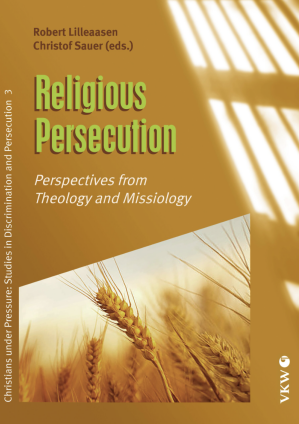
A new scholarly volume examining the theological and missiological dimensions of religious persecution has been released as the third installment in the Christians under Pressure series. Published jointly by the International Institute for Religious Freedom (IIRF) and Culture and Science Publ. (VKW), Religious Persecution: Perspectives from Theology and Missiology is now available for free download, with a printed edition to follow on Sept. 1.
Edited by Professor Robert Lilleaasen and Professor Christof Sauer, the anthology brings together contributions from scholars representing nine countries. Essays address persecution through biblical studies, church history, systematic and practical theology, missiology, and legal scholarship, offering what the editors describe as “a rich array of mainly original research findings.”
The editors frame persecution as not merely a sociopolitical challenge but a deeply spiritual and ecclesial reality that has shaped Christian identity and mission across centuries. “Theology and mission are not developed in a vacuum – they are forged in the lived experiences of believers, including those who suffer for their faith,” the book’s introduction states. The collection is intended for students, pastors, missionaries, and academics seeking nuanced engagement with persecution in both historical and contemporary contexts.
The volume is a direct outcome of the Religious Freedom and Religious Persecution research project launched by Fjellhaug International University College in 2019. The initiative was designed to encourage interdisciplinary collaboration among theologians, missiologists, and related specialists. It has hosted three research symposiums—in 2021, 2023 and 2025—which served as the primary source for many of the book’s chapters.
In the opening section on definitions, German persecution studies expert Sauer and South African legal scholar Werner Nel provide an extensive survey of how persecution is defined in legal, sociological, and theological contexts. They argue for reflective and precise use of terminology, offering their own sociological definition alongside scales and spectrums employed by NGOs and Christian agencies.
Biblical studies contributions include Norwegian Old Testament scholar Håkon Sunde Pedersen’s exploration of zeal and violence in the figures of Phinehas, Elijah, and Jehu, and Belgian scholar Geert W. Lorein’s examination of the Maccabees’ resistance to Antiochus IV Epiphanes. German-Swiss scholar Daniel Röthlisberger analyzes New Testament language about persecution, while German New Testament scholar Christoph Stenschke identifies patterns of both conflict and cooperation in the Book of Acts. Norwegian scholar Håkon Leite examines Paul’s view of suffering in the Pastoral Epistles, challenging readings that downplay its eschatological importance.
Historical and systematic theology studies include German church historian Klaus Wetzel’s survey of Christian responses to persecution from antiquity to Pietism, Danish scholar Finn Aa. Rønne’s account of reform movements within the Ethiopian Orthodox Tewahedo Church, and Sauer’s review of the 2009 Bad Urach Statement on suffering and martyrdom. Iranian-born scholar Sara Afshari develops a theology of persecution using the metaphor of Holy Saturday, while Czech scholars Věra Miláčková and Kamila Veverková examine theological reasons for fleeing persecution.
Practical theology contributions address pastoral care and congregational dynamics in persecuted contexts. Danish scholar Henrik Nymann Eriksen outlines the pastoral, mentoring, and prophetic roles of ministers supporting Christian converts facing repatriation to Muslim-majority countries. Lilleaasen contributes a study on “courageous followership” in churches under pressure, while Norwegian scholar Tonje Belibi analyzes how Norwegian Sunday school curricula portray persecution. Knut Kåre Kirkholm assesses how Lutheran preachers in Norway address the topic from the pulpit.
Missiology and religious studies chapters explore how persecution intersects with conversion, contextualization, and interfaith dynamics. German scholar Joel Hofer examines the relationship between conversion to Christianity and persecution; Meiken Buchholz discusses the “sinicisation” of religion in China; Norwegian scholar Frank Ole Thoresen surveys minority experiences of tolerance in Tunisia; and American scholar James Bultema analyzes perceptions of the Turkish Protestant movement.
In the final applied theology section, Afshari reflects critically on how Christian gatherings frame persecution, warning against reducing it to an emotional appeal. Duane A. Miller, an American missiologist and Anglican priest, offers a theological and pastoral reading of Job as a resource for persecuted believers.
The editors note that the book’s thematic structure moves from conceptual foundations to applied theology, aiming to bridge academic study and practical ministry. “Our motivation has been shaped by the desire to offer theological and missiological perspectives that speak into [the] reality” of persecution, Lilleaasen and Sauer write in their preface. “Ultimately, this book is written to serve Christians who are under pressure for their faith. We hope it will inspire, encourage, and equip.”
The Christians under Pressure series launched with Fruitful Minorities (2018), edited by Bernhard Reitsma, on Christian witness in Islamic contexts, followed by Overcomers (2021) by Kay Bascom, on God’s deliverance through the Ethiopian Revolution.
Religious Persecution: Perspectives from Theology and Missiology is available for download here.






